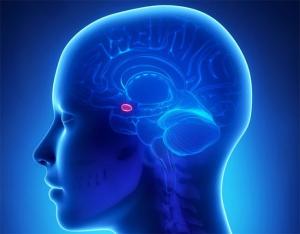Many people wonder if watching scary movies really gives viewers any real benefits? If your body becomes immune to a bacteria after experiencing an infection caused by that bacteria, will the brain also become immune to scary things by watching a screen?
To answer this, we first need to understand how the brain responds to fear.
The best horror movies are often the ones that target deep psychosocial insecurities. If these movies only deal with things that are completely unrealistic, your brain won’t perceive any threat. The purpose of horror movies is to scare the things that are in the film that might happen in real life, scaring the viewer and haunting the sources of the horror.
One of the regions of your brain involved in handling these threats is the amygdala.
The amygdala is the almond-shaped nucleus, with many interconnected neurons in the brain. This brain region processes the primal fears that humans possess and express. Apparently, the amygdala does not function independently, but is strongly linked with two other brain regions, the Hypothalamus and Hippocampus. The hypothalamus is responsible for making us respond to these fears the way that primitive brains process: by screaming and trying to run away.

The hypothalamus is responsible for making us respond to these fears the way the primitive human brain processes.
The amygdala activates the parasympathetic nervous system via the hypothalamus (HPA axis), which then instructs the adrenal glands to secrete the fight-or-flight response hormone – Adrenaline (also known as Epinephrine). When circulating in the bloodstream, adrenaline causes your body to show signs of fear, including increased heart rate, sweaty palms, dry mouth, shortness of breath, and increased blood flow to skeletal muscles. This is why you jump, scream or become more agile while watching a horror movie, because your brain is telling your body to quickly get out of the danger zone!
The rest of the brain – The hippocampus allows your brain to perceive situations. This area ensures viewers know that they are only watching one movie and that none of the horror in the movie actually harms people in real life.
So far, no one is sure about this. There is little evidence that watching horror movies makes you better equipped to deal with scary situations in real life. However, the heightened state of vigilance that a person experiences after watching a horror movie can be beneficial when it comes to keeping the person away from similar scary situations. Despite this, very few studies have been conducted to conclude or disprove this hypothesis.
On the other hand, there is some evidence that watching horror movies can help you overcome your fears.
Exposure-based treatments exercise tolerance to suffering. In it, the ability to control a high fear response will be developed by having the patient continuously interact with the object of fear. Exposure-based treatments are applied to the phobias that people experience; This can also apply to horror movies. Fear of the horror genre or a certain aspect of the horror film can be relieved by repeated exposure to it. From there, the method will make your body think that what scares you isn’t actually causing any harm.

Enjoying a scary movie can benefit the brain when dealing with other stressors.
There’s a lot of research showing that enjoying a scary movie can benefit the brain when dealing with other stressors. Some people have reported that watching horror movies helps them deal with their insecurities because the activity gives them a high dose of the hormone adrenaline, which helps relieve symptoms of anxiety.
In short, everyone has a different reaction to horror movies. Some people are thrilled, while the feeling of watching movies is no different from torture for others. It all depends on the individual brain and the brain’s ability to process fear. Therefore, horror movies can be seen as a means to improve the way you deal with fear and scary situations.

